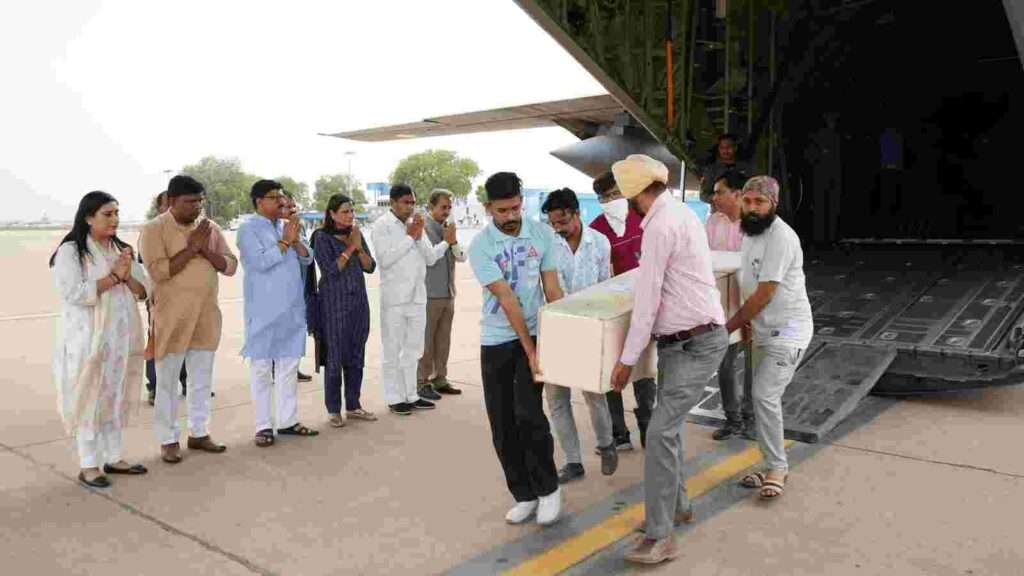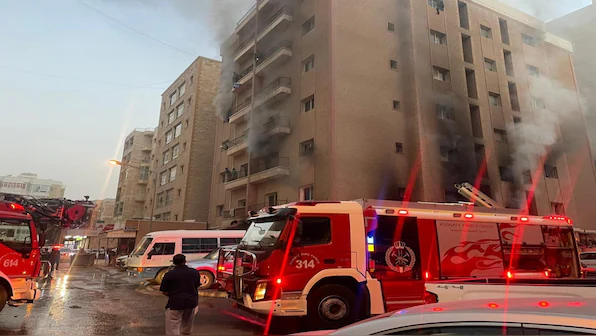Introduction
The Kuwait fire incident that killed around 50 migrant workers, of which 45 were Indians and similar recent incidents in India have raised concerns over the negligence and violations of fire safety norms and the dire consequences faced by the people.
Beyond the devastating loss of lives in Kuwait, these incidents underscore broader concerns about safety regulations, migrant worker rights, and international diplomatic responses. Understanding the context and consequences of these events is crucial for fostering awareness and advocating for meaningful change.
Kuwait Fire Incident: Causes and Casualties
A fire broke out at a building in Mangaf in Kuwait‘s Ahmadi Governorate. The building was rented to house the employees by NBTC, a group partly owned by an Indian. It housed around 195 migrant workers, which were mostly Indians.
The fire is believed to have started in a kitchen and spread throughout the building at around 4:30 am. Around 50 migrants working in Kuwait were killed, 45 of them from India and the rest from Pakistan, Philippines, Egypt, and Nepal. Kuwait Fire Force has determined that an electric short circuit led to the fire.

The main cause of death was inhalation of smoke, while 7 died due to jumping off the building to escape the fire. Around 30 people were admitted to a hospital in Kuwait for injuries with some in critical condition and on ventilator support. 96 people managed to escape from the fire unharmed.
What was the Kuwait Government’s response?
The Deputy Prime Minister of Kuwait, Sheikh Fahad Yusuf Saud Al-Sabah, has blamed the fire for the violations of fire safety norms by the building owners and ordered the arrest of the building owner and janitor for further investigations into the incident. The Kuwait government has announced compensation of $15000 each (₹12.5 lakh) to the victims’ families.
Indian Government’s Response to the Kuwait Incident
Prime Minister Narendra Modi chaired an emergency meeting to review the situation in New Delhi. The government expressed sorrow regarding the Kuwait incident and extended condolences to the victims’ families. An ex-Gratia relief of ₹2 lakh to the deceased victims’ families from the Prime Minister’s Relief Fund was also announced.

IAF aircraft were sent to Kuwait to bring the bodies of the 45 deceased Indian nationals back to the country. Kerala’s Kochi airport received 31 bodies and the rest 14 were sent to Delhi’s Palam airport through a domestic flight.
Similar Incidents in India in Recent Times
Delhi fire incidents
As the heatwave conditions in the country prevail, the national capital has suffered nearly 900 fires in mercantile establishments. By June 12 this year, 339 fires had been reported compared with 553 in the entire year of 2023.
Almost 70 percent of the fires occur due to some fault in the electricity -short-circuiting, wrong wiring, overheating, multi-plugging, and other related problems. According to a Discom official, higher temperatures have put additional stress on electrical equipment, with consumers often exceeding the sanctioned load, overloading the circuit and causing short circuits.
The fire service helpline in these areas has been busier than usual, indicating a rise in such accidents: The department in Delhi, where the mercury breached 50 degrees Celsius on May 29, 2024, is getting more than 220 calls a day at present, according to news publication Business Standard.
Uttarakhand forest fire
A combination of heatwave conditions, dry weather, and poorly equipped responders has led to a fivefold increase in major forest fires in Uttarakhand this year. According to state officials, 11 people have died in Uttarakhand forest fires that have ravaged at least 1,747 ha of land this year. The state reported 149 cases in the last seven days alone. The forest fires this year have been the deadliest in the state since 2021 when eight people died
Five people were killed in May in forest fires that have been raging in Uttarakhand since last November. The forest department attributes the fires to out-migration, high-tension wires, and the abundance of pine trees, while the State government has said in the Supreme Court that the fires are completely manmade.
Rajkot Gaming Zone Fire
On 25 May 2024, at least 33 people were killed in a fire that broke out at a gaming zone in Rajkot, Gujarat, India. This unfortunate incident has highlighted the critical importance of stringent safety protocols in public spaces, emphasizing the need for thorough inspections and adherence to fire safety regulations to prevent such devastating occurrences in the future.
Fire Safety Protocols by the Indian Government
Fire safety protocols in India are primarily governed by the National Building Code (NBC) and the Fire Prevention and Fire Safety Measures Rules. Here are some key aspects of fire safety protocols by the Indian government:
National Building Code (NBC): The NBC provides guidelines for construction and fire safety in buildings. It includes specifications for fire-resistant materials, escape routes, staircases, and fire detection and suppression systems.
Fire Prevention and Fire Safety Measures Rules: These rules outline specific measures to prevent and manage fire hazards. They cover fire detection and alarm systems, fire extinguishing arrangements, emergency lighting, and signage.
Occupancy Classification: Buildings are classified based on their use and occupancy, which determines the fire safety requirements. Different classifications have specific guidelines for fire exits, fire resistance of materials, and firefighting equipment.
Clearances and Certifications: Before occupancy, buildings must obtain fire safety clearances from the local fire department. Regular inspections and certifications ensure ongoing compliance with fire safety standards.
Training and Awareness: The government emphasizes training programs for building occupants and staff on fire prevention, evacuation procedures, and the use of firefighting equipment. Awareness campaigns promote fire safety practices among the public.
Enforcement and Compliance: Local fire departments enforce fire safety regulations through inspections and audits. Non-compliance can result in penalties or closure until safety standards are met.

Special Requirements for High-Risk Buildings: High-rise buildings, hospitals, schools, malls, and industries have additional fire safety requirements due to higher occupancy and fire risk. These include more stringent fire alarm systems, multiple escape routes, and regular drills.
Disaster Management Framework: Fire safety is part of the broader disaster management framework, with coordinated responses from fire departments, emergency services, and local authorities during fire incidents.
Conclusion
The Kuwait fire incident that killed around 50 migrant workers, of which 45 were Indians, serves as a poignant reminder of the urgent need for enhanced safety measures and improved working conditions, particularly for migrant workers. These incidents should prompt collaborative efforts among governments, employers, and international organizations to prioritize the safety and well-being of all individuals, regardless of their nationality or migrant status. Through proactive measures and sustained advocacy, we can strive to prevent such tragedies in the future and ensure that every life is valued and protected.
-SHIVANGI NAIR & BHAWNA
Must Read: NOT SO NEAT: NEET 2024 RESULTS CONTROVERSY


